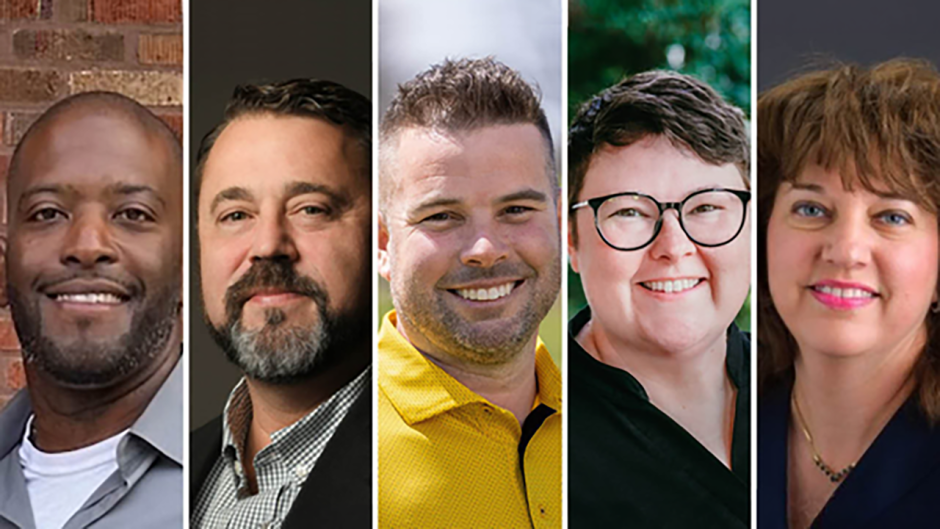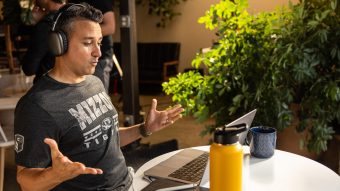
Oct. 16, 2025
Contact: Sara Diedrich, diedrichs@missouri.edu
The University of Missouri runs on more than tradition and Tiger pride. It’s powered by the people who work behind the scenes to keep campus life running smoothly. From safeguarding our storm sewers to helping students navigate their coursework, these leaders embody what it means to serve the Mizzou community.
On Boss’s Day, Oct. 16, we’re celebrating five managers who help our university shine every day.
Terrance Camp
Supervisor
Department of Energy Management
If you’ve never seen Terrance Camp on campus, that’s because most of his work happens underground.
Camp, who started at Mizzou 15 years ago and has held a number of positions, now leads a nine-member crew that ensures the campus operates efficiently by overseeing its underground utilities. Camp manages their daily work, ensures equipment is well maintained and makes sure the team has the materials they need.
In total, the crew oversees about 136 miles of buried pipe beneath campus.
“Some days I’m on the steam side, working in manholes and tunnels,” Camp said. “Other times, we’re digging trenches for water or sanitary lines. Most of my work is outside.”
His team’s work is essential to around-the-clock operations such as MU Health Care and the MU Research Reactor (MURR).
“Those facilities depend on our water, steam and power,” Camp said. “The isotopes that leave MURR every day? We play a small part in making that possible, and that’s pretty cool.”
The crew uses advanced technology to monitor and maintain the system. Their camera van, which looks like something out of a crime scene investigation show, sends tiny cameras into storm sewers and sanitary lines to inspect for problems before they become emergencies.
No matter where they’re working, Camp and his crew play a critical role in powering the campus behind the scenes.
“Most people don’t realize we’re here, until something stops working,” he said. “Then they suddenly understand how essential our service really is.”
Camp is proud of his crew and the work they put in each to keep the campus powered and running.
“My team is fun, self-motivated and driven, and that makes every day better,” he said. “We push each other to improve. ‘Iron sharpens iron’ is one of my favorite sayings, and it describes my crew perfectly. Being part of that kind of team keeps me energized and proud of the work we do together.”
Chris Pearman
Assistant director
Environmental Health and Safety
Chris Pearman is the assistant director of Environmental Health and Safety at Mizzou, where he has been working to keep campus safe for more than 25 years.
The responsibilities of Environmental Health and Safety are broad and include managing laboratory safety, hazardous materials, radiation safety, biological safety and environmental compliance.
“The work we do happens behind the scenes, but it’s critical to the university’s success,” Pearman said. “Safe labs, compliant research and healthy facilities allow students, faculty and staff to focus on teaching, learning and discovery without unnecessary risk.”
Pearman first began working in the technical services section and worked his way up to his current position. A turning point in his career came when he took advantage of Mizzou’s tuition assistance program and completed his bachelor’s degree. At the time, he had an associate’s degree.
“That opportunity allowed me to complete my bachelor’s degree, and it opened the door for every promotion I’ve received since,” he said. “Over these 26 years, I’ve been fortunate to grow alongside the university, supported by mentors who taught me to work hard, make the most of Mizzou’s resources and never be afraid to try new things.”
Ultimately, Pearman’s team ensures that Mizzou remains in good standing with state and federal regulations, which is essential for research funding, campus operations and Mizzou’s reputation.
“Just as importantly, our work builds trust,” Pearman said. “When a researcher knows they can call us for help and get a practical solution, or when a student feels confident stepping into a lab because safety measures are in place, it reinforces that Mizzou is a place where people are supported. In that way, our work is part of the foundation that makes the university’s mission possible.”
Above all else, Pearman remains motivated through his joy of helping others and watching staff members grow.
“Seeing our team members build new skills, take on bigger responsibilities and thrive in their careers is incredibly rewarding,” he said. “To me, leadership isn’t just about solving today’s problems; it’s about investing in people so they’re ready for tomorrow’s opportunities, just like my previous mentors did for me. That combination of serving the campus community and watching our own staff succeed is what inspires me to keep giving my best every day.”
Jackie Schneller
Director of academic advising
College of Education and Human Development
For Jackie Schneller, the heart of advising future educators lies in advocating for and supporting students on a holistic level. She and her six-member staff understand that advising college students is much more than just helping them choose classes.
“It’s about building their confidence, teaching them how to advocate for themselves and preparing them for future roles as teachers, where they’ll also need to advocate for their own students,” she said.
Collaboration is another key piece to effective advising.
“In their careers, our students will constantly work with colleagues and parents, so I try to model that collaboration in advising,” Schneller said. “It’s not just about academics; it’s about showing them what it looks like to work together, even through difficult situations.”
As a manager, Schneller works to empower her staff and to make sure each person feels heard.
“I want to foster their growth both personally and professionally,” she said. “I want them to feel they can come to me with any concern or idea and know that I will be open minded and help brainstorm ideas.”
Schneller’s work with students at Mizzou began in 2007 when she was hired as a residence hall coordinator. Along the way, she advanced in her career and earned a doctorate in education from the University of Missouri–St. Louis.
Ultimately, Schneller hopes to teach her students a valuable lesson: how to show up every day, even when challenges arise.
“For students, I make it clear that my door is always open,” she said. “If they need anything, I want them to feel comfortable reaching out. We want students to feel at home here at Mizzou — seen, supported and in an environment where they can truly thrive. When that happens, their chances of success are so much greater.”
Schneller also believes that supporting and advocating for her staff directly benefits students.
“I want my staff to come to work knowing that they are valued,” she said. “It is important to me that I establish an environment where trust, honesty and respect are at the core of how our office works together.”
Schneller appreciates the support she receives from other directors on campus through the Academic Advising Leadership Council.
“Having that group to lean on keeps me motivated, knowing I’m not alone and that I can count on their perspectives means a great deal,” she said. “I truly appreciate the way my peers show up for each other, day in and day out. At the same time, my students and staff are the reason I’m here. My goal is always to support them as fully as I can, whether that means having difficult conversations, brainstorming solutions together or simply being someone who listens. Sometimes they don’t need my advice; they just need an open ear. In the end, my staff, students and peers all make me better.”
Aaron Wier
Director of golf operations
A.L Gustin Golf Course
No one is more passionate about Gustin Golf Course than its director, Aaron Wier.
For him, the magic of Gustin lies in both the beauty of the course and the loyalty of his staff, several of whom have served for decades. He leads a team of four full-time employees, supported by dedicated student workers. Alongside the course, Gustin features a pro shop and a clubhouse that serves food and beverages. Gustin also offers lessons and hosts some of the region’s biggest tournaments, including the Show Me State Games. Each year, about 28,000 rounds of golf are played there.
“Our course sits on 127 acres of prime property, just a third of a mile west of the Memorial Stadium and in the heart of Columbia — yet surrounded by a peaceful, country-like setting with no nearby homes,” Wier said. “The course is in phenomenal shape, thanks to the dedication of our staff.”
The course is not only beautiful but also teeming with wildlife. It is home to 27 bluebird houses and nine pollinator plots that support butterflies and bees. Gustin was the first university golf course to earn Audubon certification in 1995.
“I make it a priority to encourage everyone to experience our grounds,” he said. “It’s a rare opportunity to enjoy nature right in the middle of town.”
Wier began working at the university’s 66-year-old golf course as a student and joined the staff full time in 2009 after earning a bachelor’s degree in parks, recreation and tourism from Mizzou. He was named director of golf operations in 2023.
Wier believes Gustin is an important part of campus because it provides recreation and a much-needed mental break.
“Gustin is more than a golf course,” he said. “It’s a place to connect with nature, learn, relax and enjoy a game that brings people together across generations.”
Wier remains motivated by his staff, who arrive at the crack of dawn each day to make sure the course is in tip-top shape. He keeps a whiteboard on the wall in his office where he documents the staff’s achievements.
“It’s a great visual of what we’ve accomplished,” Wier said. “I believe it’s essential to be goal-driven, so we hold meetings to discuss goals and progress. I also believe it’s critical to give staff trust — it’s absolutely vital. Providing the right tools and consistent support, along with clear communication about shared goals, allows the team to reach their highest potential. When those three elements are in place, there’s no limit to what we can achieve.”
Lori Wilcox
Director
Human Subjects Research Protections Program
At the University of Missouri, every research project involving human participants passes through the capable hands of Lori Wilcox and her 11-person team at the Human Subject Research Protections Program.
“We ensure that every individual who participates in research has their rights, privacy and safety protected,” Wilcox said. “In addition to safeguarding participants, we also support researchers by making sure all studies comply with federal, state and institutional policies. Our goal is to create an environment where research can move forward responsibly, ethically and in compliance with all regulations.”
That’s no small task for Wilcox’s team, which is part of the Division of Research, Innovation and Impact. The team currently has about 3,600 active researchers — including faculty, staff and students — and more than 2,600 active studies, with approximately 900 new studies submitted each year.
The team doesn’t typically interact directly with participants, but it plays a key role in making sure individuals understand the information and processes provided by the researchers.
“For example, during the consent process, participants must receive clear, accurate information about what the study involves, what’s expected of them and their right to withdraw at any time,” she said. “We also confirm that recruitment materials are appropriate. The emphasis is always on informed consent, ensuring individuals fully understand what they’re agreeing to.”
Wilcox also works to provide Mizzou’s researchers with the tools, training and guidance needed to conduct ethical and compliant research.
“Since August 2024, for example, we’ve trained nearly 1,500 students through our new student training program, helping prepare the next generation of responsible researchers,” she said.
A three-time Mizzou graduate, Wilcox holds a bachelor’s degree in agricultural economics and accounting, a master’s in agricultural economics and a doctorate in educational leadership and policy analysis.
Wilcox, who has been with Mizzou for more than 30 years, is especially proud of her team which collectively have 204 years of service to Mizzou.
“Out of the 11 of us, nine have earned or are pursuing degrees from Mizzou, reflecting our shared dedication to the university and its mission,” she said.
Wilcox knows that research at Mizzou depends on the work of her team — and it’s that responsibility that motivates her every day.
“We help ensure the integrity of the institution, maintain public trust and uphold the ethical purpose that guides all research,” she said. “We share a strong commitment to the bigger picture — serving the greater good and supporting outreach to the community. We truly believe we make a difference by advancing research and intellectual discovery that benefits our state and, ultimately, mankind.”



